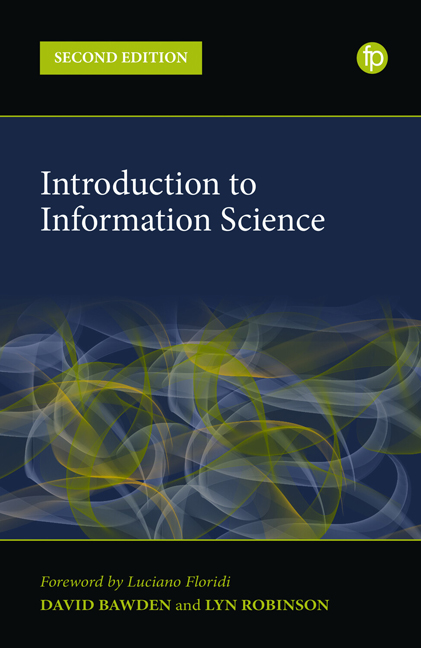Book contents
- Frontmatter
- Contents
- Figures
- Preface
- Foreword – Curators of Semantic Capital
- List of Acronyms
- 1 The Information Science Discipline
- 2 History of Information: the Story of Documents
- 3 Philosophies of Information
- 4 Paradigms, Turns and Theories in the Information Sciences
- 5 Information
- 6 Documents and Documentation
- 7 Domain Analysis
- 8 Information Organisation
- 9 Digital Technologies and Data Systems
- 10 Information Systems
- 11 Informetrics
- 12 Information Behaviour
- 13 Communicating Information: Changing Contexts
- 14 Information Management and Policy
- 15 Information Law and Ethics
- 16 Information Society
- 17 Digital (Onlife) Literacies
- 18 Research in the Information Sciences
- 19 The Future of the Information Sciences
- Additional Resources
- Index
1 - The Information Science Discipline
Published online by Cambridge University Press: 21 April 2022
- Frontmatter
- Contents
- Figures
- Preface
- Foreword – Curators of Semantic Capital
- List of Acronyms
- 1 The Information Science Discipline
- 2 History of Information: the Story of Documents
- 3 Philosophies of Information
- 4 Paradigms, Turns and Theories in the Information Sciences
- 5 Information
- 6 Documents and Documentation
- 7 Domain Analysis
- 8 Information Organisation
- 9 Digital Technologies and Data Systems
- 10 Information Systems
- 11 Informetrics
- 12 Information Behaviour
- 13 Communicating Information: Changing Contexts
- 14 Information Management and Policy
- 15 Information Law and Ethics
- 16 Information Society
- 17 Digital (Onlife) Literacies
- 18 Research in the Information Sciences
- 19 The Future of the Information Sciences
- Additional Resources
- Index
Summary
Information science is, or should be, involved with the whole concept of knowledge in whatever form its manifestations may take.
Jesse Shera (1973, 286)Let us not restrict ourselves to grubbing around in the garden patch of a limited, little information science, restricted to the relationship between information and machine. Instead, let us expand, reach out, embrace and explore the wider world of information, to develop a vision of information science as a central synthesising discipline in understanding not simply information, but the world we live in. Because the world we live in is surely a world of information.
Tom Wilson (2010)Introduction
The subject of this book is information science. We begin by asking what information science is, as an academic discipline and profession. Obviously, and simplistically, it is the science of information. But this is not sufficient, since the multiple meanings and implications of information, which will be discussed in Chapter 5, have given rise to different conceptions of information science (Buckland, 2012; Limberg, 2017). One such conception is of information science as being concerned with computing, algorithms and data science, a second with information and communication technologies and a third with information as an entity with physical and biological science. A fourth conception sees information science as concerned with information recorded in documents, with meaning and knowledge, and hence as growing from the older disciplines of librarianship and documentation. We will focus on the last of these in this book, although we will mention aspects of the others at appropriate points.
We will therefore be following the kind of definition which goes back at least as far as Borko (1968) and is expressed by Saracevic (2010, 2570) as:
Information science is the science and practice dealing with the effective collection, storage, retrieval and use of information. It is concerned with recordable information and knowledge, and the technologies and related services that facilitate their management and use.
This gives us a general idea of the nature of the subject, but there is still scope for much difference in viewpoint as to exactly what the subject comprises and how it should be understood; see Bates (1999), Hjørland (2000), Robinson (2009), Ibeque-SanJuan et al. (2014) and Bawden and Robinson (2016).
We now examine the nature of the subject in more detail.
- Type
- Chapter
- Information
- Introduction to Information Science , pp. 1 - 18Publisher: FacetPrint publication year: 2022



